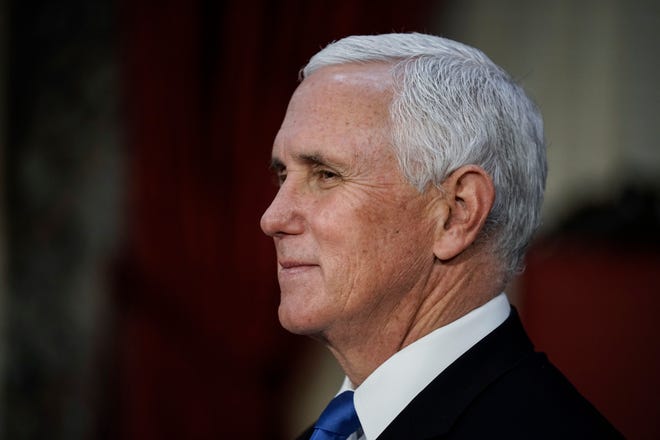
Congress' count of the Electoral College, a normally symbolic affair affirming the president-elect's victory, is set to be a contentious, lengthy process when the House and Senate convene in a joint session to count the electoral votes on Wednesday.
In an effort that has divided the Republican Party, over a dozen Senate Republicans and at least 50 House Republicans are set to object to the counting of electoral votes from states that President Donald Trump contested after Election Day. No Democrats are expected to object to the results.
Trump has urged Republican lawmakers to join the objections, but the effort is unlikely to succeed because a majority of both the House and Senate is needed to exclude any electoral votes.
Congress is set to meet on Wednesday at 1 p.m. EST as protesters descend on Washington. Here is what to expect:
What is the procedure for the count?
Members of the House of Representatives and Senate will meet in a joint session in the House Chamber to count the electoral votes and declare an official winner. States already certified the results of their own elections. The procedures for the session come from the Electoral Count Act of 1887.

Vice President Mike Pence is expected to preside over the joint session in his role as president of the Senate. If Pence is not present, the most senior member of the Senate, Sen. Chuck Grassley, R-Iowa, will preside. Leaders of both major parties will also appoint lawmakers from both chambers to serve as "tellers."
Pence will open certificates of the electoral votes from each state – whose electors met to cast their ballots Dec. 14 – and hand them to the tellers to read aloud. As they read a state's certificate, Pence will call for objections to the state's votes.
To be considered, objections must be made in writing and endorsed by at least one member of both the House and Senate.
Any objection that meets that criteria will result in a suspension of the joint session, at which time the House and Senate will convene separately to consider the issue.
The debate on each objection is limited to two hours. Each member may speak only for one, five-minute stint, and the fissures among the GOP on the objections will put some Republicans in the unusual situation of arguing on the same side as Democrats against the wishes of the president.
Past dramatic moments:Congress' count of Electoral College votes could be most contentious in 144 years
Rep. Tom Reed, R-N.Y., co-chair of the bipartisan Problem Solvers Caucus, told reporters on a conference call Tuesday he expected to see "Republicans having an honest debate on this issue," even as GOP members of his group took different sides.
On the House side, Democrats have chosen several lawmakers who are well-versed in the Constitution and law to lead their rebuttals of any GOP challenges on specific states. Speaker Nancy Pelosi, D-Calif., will preside over any debate in the House.

Senate Democrats have a similar tactic in place, planning to cite Republican officials and judges in each state that certified the results of the election.
Sen. Amy Klobuchar, who will be guiding some of the debate for Democrats, told USA TODAY the debate in the Senate will look different than it would in the House and would display a "bipartisan pushback and that's how our debate will be structured."
"I think you're going to see a different flavor to the argument in the Senate because we will have a number of strong figures on the Republican side who are joining us in this," Klobuchar noted, adding that she has spoken with many Republicans over the days as the Senate prepares.
Republicans in both the House and Senate have spoken out against the effort to object to the electoral vote counting.
She added that in each state, Democratic senators, through their five-minute speeches, will display the key Republican officials in the state that certified results or pushed back on Trump's claims of fraud.
"In all of these states, we will be emphasizing the fact that it wasn't just one party that certified these elections. In some states, it was a dominant Republican Party," Klobuchar said.
Senate Republicans do not appear to have a set plan on how the day will look. Senate Majority Leader Mitch McConnell is allowing his fractured conference to vote as they will on objections after making his thoughts on the process well-known early on, according to a GOP aide who was not authorized to speak publicly on the plans.

Despite McConnell's opposition to lodging objections, he has spoken with senators individually to offer guidance, but no formal plan has been sent to members of the conference.
Large protests are expected across Washington on Wednesday, and the president is sure to keep tabs on the events.
After debate concludes, the House and Senate will vote.
A simple majority in both chambers is required to uphold the objection and throw out the state's votes. Short of that, the objection is disposed of and the state's electoral votes are counted as cast.
After all the votes are counted, it falls to Pence to declare the winner of the election.
'We'll hear the objections':Vice President Mike Pence promises Georgia voters
So far, Pence – who has not acknowledged that Trump lost his bid for reelection – has remained relatively quiet on his role in the electoral vote count process.
On Dec. 28, Republicans including Texas Rep. Louie Gohmert filed a lawsuit in federal court to authorize Pence to pick and choose which electoral votes to accept or reject. In a filing Dec. 31, Pence asked the judge to dismiss the suit, which his brief called "a walking legal contradiction."
The suit has since been dismissed by courts because of Gohmert's lack of standing.
Trump has publicly pressured Pence to intervene in the proceedings.
“I hope Mike Pence comes through for us,” Trump said at a rally in Georgia on Monday night. “He’s going to have a lot to say about it.”
"The Vice President has the power to reject fraudulently chosen electors," Trump tweeted Tuesday.
State officials have not found evidence of widespread fraud in any of the states contested by Trump, and Pence does not have the power to reject electors. Under the 12th Amendment, Pence's role is just to "open all the certificates" and preside over their counting.
Who is objecting?
At least three states will draw objections from both senators and members of the House, starting the process for Congress to debate the counting of electoral votes from them.
Over a dozen Republican senators have said they will object, including Sen. Kelly Loeffler, R-Ga., who is likely to object to the results in Georgia.

Sen. Ted Cruz, R-Texas, spearheaded a group of senators who said they would join in House lawmakers' objections. Cruz will object to the Arizona results, according to a source familiar with his plans not authorized to speak on the record.
Another Republican senator, Josh Hawley of Missouri, is likely to object to the votes from Pennsylvania.
On the House side, Rep. Mo Brooks led the charge and has met with the White House about his proposal. The Alabama Republican said in a Jan. 4 statement he would object to results from Arizona, Georgia, Michigan, Nevada, Pennsylvania and Wisconsin – states whose electoral processes he said were "badly flawed" and "untrustworthy."
More:The members of Congress who are planning to object to Joe Biden's Electoral College win
However, some top Republican lawmakers have argued against objecting to the results.
Rep. Liz Cheney, R-Wyo., the third-ranking House Republican, circulated a memo among GOP lawmakers calling the objections "directly at odds with the Constitution's clear text and our core beliefs as Republicans," according to a source familiar with the memo.
And Sen. Roy Blunt, R-Mo., a member of Senate Republican leadership, told reporters he would not support the effort, adding, "I actually like to come up with plans that have a chance of being successful."
Have there been objections before?
Objections to electoral votes are rare.
In 2017, half a dozen House Democrats objected to electoral votes for Trump, citing voter suppression and potential interference from Russia.
But Joe Biden, then-vice president and president of the Senate, repeatedly slammed his gavel and rejected the effort because they lacked a Senate sponsor.
“It is over,” he said, to applause from Republicans.
Just twice – in 1969 and 2005 – have there been objections that met the criteria to require the House and Senate to debate and vote.
In 1969, the objection was over a faithless elector from North Carolina who voted for George Wallace instead of Richard Nixon. The objection to the faithless elector was rejected by both chambers.
In 2005, the objection was over electoral votes in Ohio cast for George W. Bush.
Sen. Barbara Boxer, D-Calif., joined Rep. Stephanie Tubbs Jones, D-Ohio, in the action, which they said was to raise awareness about voter suppression.
"This objection does not have at its root the hope or even the hint of overturning the victory of the president," Tubbs Jones said at the time. "But it is a necessary, timely and appropriate opportunity to review and remedy the most precious process in our democracy."
The objection was roundly defeated, receiving a single vote in the Senate, from Boxer herself, and just 31 votes in the House, all from Democrats.
Could an objection succeed?
In short, no. Like the two previous objections, there is virtually no chance that any challenges lodged will succeed.
The most straightforward reason the objections will fail is that they must be approved by both chambers, and Democrats control the House.
The Senate is harder to predict. The runoff for seats in Georgia that will determine control of the Senate takes place just a day before, on Jan. 5.
Loeffler is still seated as a U.S. senator because she was appointed to fill a term going through 2023, but Sen. David Perdue, R-Ga., who was also up for reelection in Tuesday's runoffs, is no longer a senator after his term lapsed Sunday.
Republicans still maintain a majority. But top Republican leaders like McConnell have declined to publicly back the objections. Only a handful of Republican senators need to vote against the objections for them to fail, assuming all Democrats vote against the objections.
In late December, Sen. John Thune, the No. 2 Senate Republican, told reporters that an objection "would go down like a shot dog" in the Senate.
"I just don’t think it makes a lot of sense to put everybody through this when you know what the ultimate outcome is going to be," said Thune, who is from South Dakota.

Regardless of the outcome in the Senate, without the approval of the House, objections will not change the Electoral College vote totals.
Though the challenges are doomed to fail, they will extend the vote-counting process far longer than normal.
The joint session took just 23 minutes in 2013 and 41 minutes in 2017, according to the Congressional Research Service. Not this time.
If all six planned objections from the House receive support from a member of the Senate, total debate time could exceed 12 hours, and the process could take over 24 hours once time to clean the chamber and time for votes is factored in, House Majority Leader Steny Hoyer, D-Md., told reporters Monday.
Recesses are also allowed under the law governing the counting of electoral votes, though it is unclear whether Congress will take breaks.
If that's the case, the meeting could wrap up sometime Thursday – or later – ending, at long last, the presidential election.
Contributing: Christal Hayes
Source link







